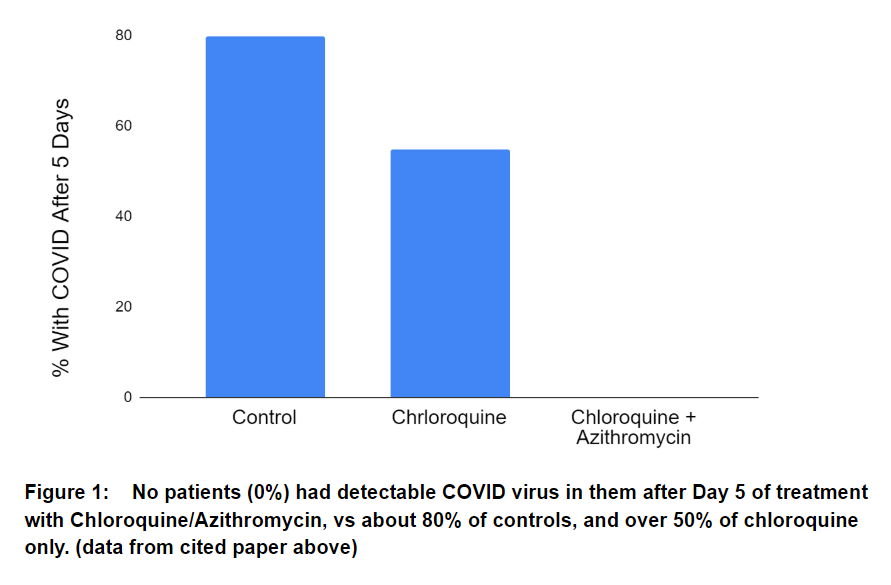|
“Antibiotics are only for bacterial infections, they don’t work on viruses!” How many millions of times has this been repeated in clinics over the decades? This advice even pops up on the front of search engines as a warning if you search something related (I just tried). But it turns out this may not be totally accurate. Some antibiotics may indeed have antiviral effects, and this may have huge implications for nasty diseases like COVID-19. A very recent bombshell study showed the antibiotic azithromycin (the ingredient in Z-packs) appears strongly antiviral when paired with another medication (chloroquine), in patients suffering from coronavirus COVID-19 (see Fig 1 below). If these early results hold up, this is an absolute game changer in the war against the COVID-19 virus, brought to you in part by a well-known antibiotic.
After seeing the dramatic results against COVID-19, I wondered if scientists had already suspected that azithromycin (AZM) was antiviral before the COVID crisis. By doing a very casual search of the science literature, I stumbled across this 2015 study titled “Novel antiviral properties of azithromycin in cystic fibrosis airway epithelial cells.” The title itself says AZM is antiviral, and their research showed it works against rhinoviruses that cause the common cold. Another test of AZM on influenza in lab mice showed that it “successfully reduced viral load in the lungs.” So perhaps this antibiotic fights the flu, which kills tens of thousands every year. Yet another lab showed that AZM “greatly alleviated the disease symptoms and increased the survival rate in a mouse model severely infected with” enterovirus A7, another nasty bug. In the real world, a 2015 JAMA study showed that giving AZM to children with respiratory tract infections reduced the chances that it increased to a severe infection, and many of these cases were no doubt caused by viruses. It’s a real head-scratcher why this hasn’t been much more aggressively investigated over the past few years, especially since we already know the safety data on giving AZM to humans. But with COVID threatening us, looks like we are wising up and pushing ahead on testing quickly. THE TAKE HOME: Safe, well-known antibiotic azithromycin seems to also attack viruses, and may help fight really nasty ones like influenza and coronavirus. More experimental results from coronavirus testing may be coming soon, so stay tuned!
0 Comments
Leave a Reply. |
about the authorSJadon Webb, M.D., Ph.D.
Owner Bloom Mental Health Shannon Keane,
MSN, FNP-C, PMHNP-BC Clinical Director Disclaimer: this blog is NOT intended as medical advice and does not imply any kind of specific guidance or treatment recommendations, and should NOT be used to guide a treatment protocol. (read full disclaimer)
Afton Williamson,
DNP, MSN, FNP-BC Family Nurse Practitioner |
Location |
|




